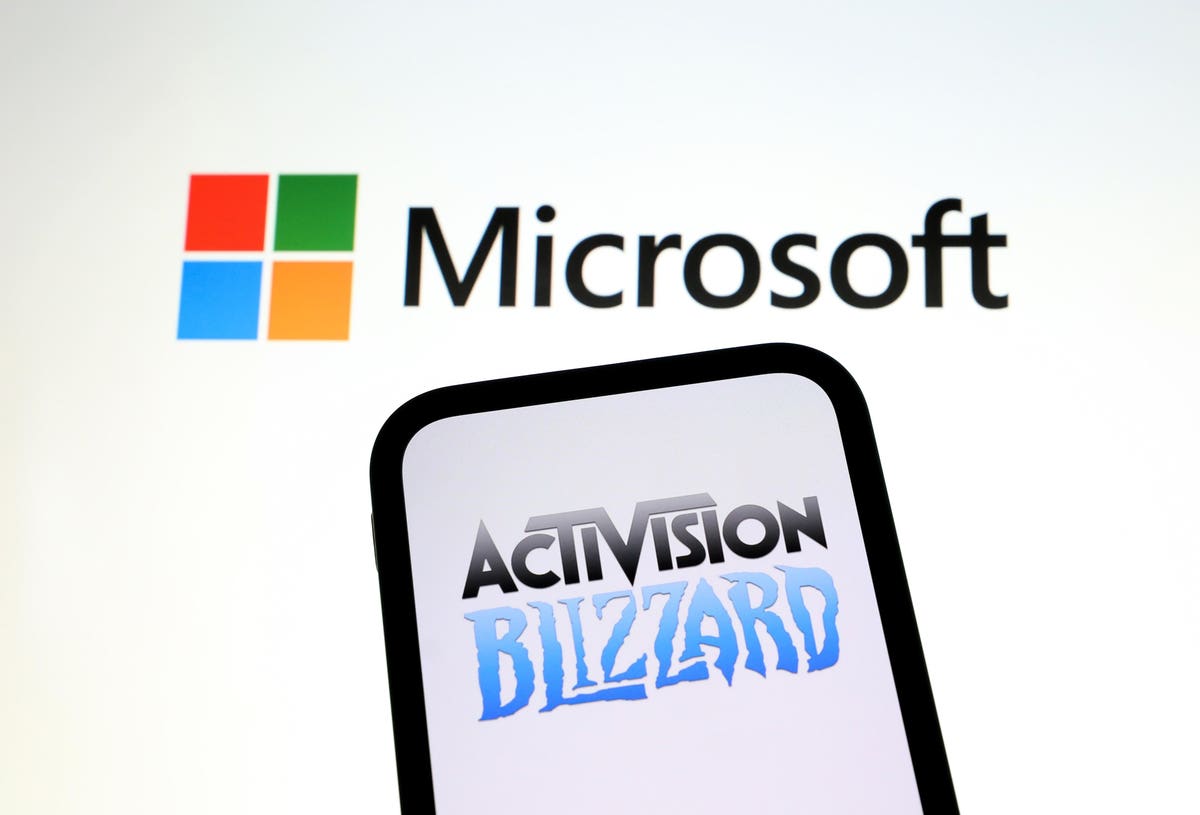In January 2022, Microsoft cut a $69 billion deal to acquire Activision Blizzard, maker of the video games Call of Duty and Candy Crush.
At the time, I saw four reasons the deal could be good for investors: a large market opportunity in gaming and the metaverse, potential to increase the combined companies’ market share, a positive net present value, and strong integration of the two companies.
Since then, two significant developments have emerged:
- Regulators have given mixed verdicts. While the EU approved the deal, American and British regulators have raised objections “on the grounds that it would undercut competition,” according to the New York Times.
- The metaverse seems to have faded into the background and a new industry — cloud gaming — could help determine whether U.S. and U.K. will approve the acquisition.
Will Microsoft’s Activision Blizzard deal go through? If so, is that good for Microsoft stock? If it isn’t approved, will Microsoft stock fall?
I think the odds now are greater that deal will be approved and that is good for the stock.
If the deal is not approved, Microsoft stock — which has eked out a 5% gain since the January 2022 announcement — remains a good investment thanks to revenue potential from ChatGPT.
In fact, given the $40 billion in new revenue that its AI skills could bring to Microsoft’s top line, investors might be better off if the $69 billion earmarked for Activision Blizzard was spent on expanding its AI business instead.
Microsoft’s $69 Billion Activision Blizzard Deal
Seventeen months ago, Microsoft made a nearly $69 billion cash offer to acquire Activision Blizzard.
With 400 million gaming users, leaders at Microsoft’s Redmond, Washington headquarters were grabbing an opportunity to buy the company on the cheap. After all, its stock had fallen 27% in the wake of a July 2021 lawsuit alleging “sexual harassment and discrimination that senior executives ignored,” according to the Times.
Regulatory approval of the deal was not assured due to antitrust grounds. Specifically, there was concern that Microsoft would use its control of popular new Activision game releases to encourage consumers to buy its Xbox console.
More specifically, Cowen analysts anticipated a mere 33% chance that the deal would be approved. That’s because regulators might be concerned that Microsoft would favor the release of Activision games on Xbox over rivals such as Sony’s PlayStation which could elicit a lawsuit to block the deal, MarketWatch reported.
Here are four reasons I thought the deal could be good for Microsoft investors:
- It aimed at three potentially large markets. These included the $41 billion video game publishing industry, the $81 billion gaming console market; and the metaverse — which was a dream in 2022 and was estimated to grow at a 39% average annual rate to $21.7 trillion by 2030.
- Microsoft’s share of the first two markets would increase. Specifically, adding Activision’s 10% share of video gaming to Microsoft’s 23.9% slice of the pie would result in a considerable boost in its post-deal market position. Microsoft would likely give preference to its Xbox and gamers were more confident that Redmond would make better new games.
- Positive net present value. The future cash flows from the deal discounted to the present would exceed the $69 billion purchase price by $4.4 billion, according to my calculations back then. The most important assumption was that the cash flows from the deal would continue to grow at Activision’s 25% average annual rate.
- Strong integration of the two companies. Given Microsoft CEO Satya Nadella’s success with acquisition integration in previous deals — such as LinkedIn and GitHub — a similar success was more likely with Activision.
The Decline Of The Metaverse And The Rise Of Cloud Gaming
In early 2022, I was still getting used to Facebook’s name change to Meta Networks — a decision announced in late October 2021. Since then, the reason for the name change — a huge investment in the amorphous metaverse — does not seem to make much sense now.
Indeed, last July, Meta’s financial results and stock price had plunged — costing the company $230 billion in stock market capitalization after an awful February 2022 financial report.
What’s more, Mark Zuckerberg announced plans to reduce by 30% to 40% the number of people Meta would hire in 2022. Since then, Meta eliminated 11,000 jobs in November 2022 and announced another 21,000 cuts in March 2023, noted the Washington Post.
The new thing is cloud gaming — which uses 5G networks to give gamers a wireless, low latency gaming experience on TVs, phones and tablets without requiring customized hardware such as the Xbox or PlayStation.
The market for cloud gaming totaled $3.2 billion in 2022 and is anticipated to grow at a nearly 43.6% average annual rate to $40.8 billion by 2029, according to Fortune Business Insights.
Regulatory Approval Status And Next Steps
Cloud gaming helped Microsoft win the 27-nation EU’s approval for its Activision deal on May 15. EU officials said they would allow the deal because Microsoft “made concessions to ensure that rival companies of new online gaming services would have continued access to titles developed by Activision,” the Times reported.
Specifically, Microsoft agreed to make Activision titles available on cloud gaming platforms for a decade after the deal closes “on cloud gaming services being developed by other companies, such as Nvidia,” noted the Times. Meanwhile. U.S. and U.K. regulators oppose the deal because they fear it would squelch competition — in part by slowing the growth of the cloud gaming industry.
Sixteen governments must approve the deal. In December 2022, the Federal Trade Commission sued to block the deal. On April 26, Britain’s Competition and Markets Authority (CMA) rejected Microsoft’s bid, noted the Times.
The FTC opposed the deal because it “would harm consumers and lure gamers away from rivals.” The CMA “stands buy its decision to oppose the deal.”
Can Microsoft’s strategy for gaining EU approval of the deal help it win over these two regulators?
Microsoft President Brad Smith said its concessions would benefit consumers. “The European Commission has required Microsoft to license popular Activision Blizzard games automatically to competing cloud gaming services. This will empower millions of consumers worldwide to play these games on any device they choose.”
The EC concluded this concession would remove Microsoft’s incentive to deny PlayStation — which has a large share of the European gaming console market — access to Activision titles because doing so would lower Microsoft’s profit.
CMA still opposes the deal. “They would replace a free, open and competitive market with one subject to ongoing regulation of the games Microsoft sells, the platforms to which it sells them, and the conditions of sale. This is one of the reasons the CMA’s independent panel group rejected Microsoft’s proposals and prevented this deal,” CEO Sarah Cardell said in a May 15 statement.
Significant uncertainty remains about whether Microsoft can reverse the opposition from the FTC and CMA.
Is Microsoft Stock A Buy?
Microsoft stock reflects the low probability of regulatory approval for the Activision Blizzard deal. I wonder whether investors have modeled the benefit of ChatGPT.
Last month I estimated that ChatGPT could add $40 billion to Microsoft’s revenues. To put that into perspective, in the year ending March 2023, Microsoft generated about $208 billion in revenue. So, ChatGPT revenue could add 20% to Microsoft’s top line.
By contrast, Activision Blizzard’s revenue for the period was $8.1 billion, some 2% below the year before level — representing about 4% of Microsoft’s revenue.
Were the Activision Blizzard deal to fall apart, it would free up $69 billion in cash that Microsoft could invest in ChatGPT-related new business lines.
That might be just what Microsoft investors need.
Read the full article here













